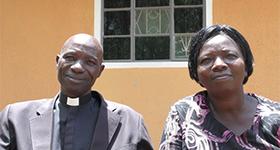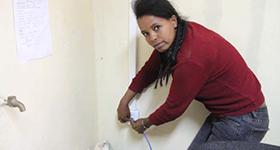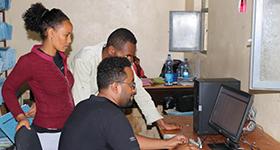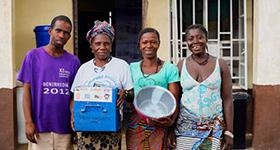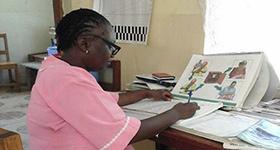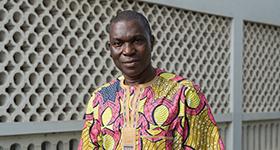Background
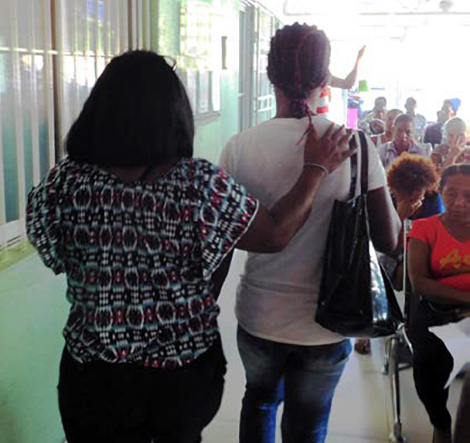
A patient navigator leads the way to the dispensing window for patient's first ARV regimen. Photo: Ruth Taveras, JSI/APC
"When I first arrived at Clínica de Familia in June 2018, I felt lost and disoriented. Then when I met Rosa, the patient navigator, I received unconditional support and felt like I was part of a family because she understands the fears you have when you live with this condition.” This testimonial from Juan, a 22-year-old man who receives treatment for HIV at Clínica de Familia in La Romana, describes the value of the support this HIV clinic provides to new patients. For the patient, the navigator’s support is fundamental to being able to understand, initiate, and stay on antiretroviral therapy for life.
Like Juan, Nany, a migrant woman who receives HIV care at the Lotes y Servicios health center in Santo Domingo, also values the support received from her patient navigator. “When Patria found me, I was emaciated. People would tell me that I had AIDS. I could not get a job,” she stated. Nany had stopped treatment, but re-enrolled on antiretroviral therapy (ART) when Patria, a patient navigator from REDOVIH+, a community-based NGO that provides community care and support to patients on treatment at Lotes y Servicios, traced her to re-enroll her into care. That was in September 2017, and Nany’s viral load was 37,800 copies/ml.
Juan and Nany are two of the 8,643 patients on treatment supported by a total of 13 PEPFAR-funded patient navigators. These essential staff help to link patients in their communities to the six HIV clinics supported by the Advancing Partners & Communities (APC) project where they receive care.
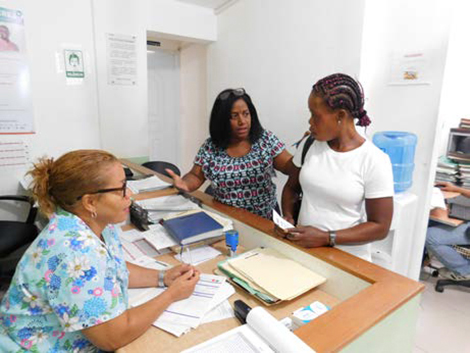
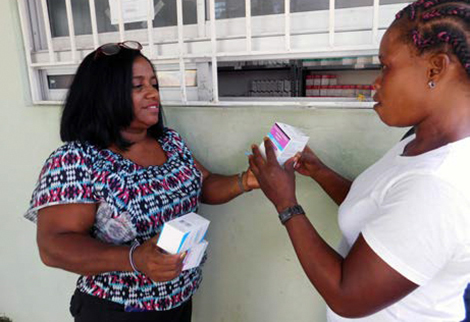
A patient navigator at Lotes y Servicios Health Center guides a new patient through the process for starting ART. Photos: Ruth Taveras, JSI/APC
Intervention
Patient navigators community leaders and peers are (members of key population groups and most on treatment themselves) who support linkage to care and follow up for newly diagnosed HIV individuals and provide essential counseling to strengthen treatment adherence. These patient navigators are also trained to trace, re-enroll, and retain patients on care at the HIV clinics. In addition, patient navigators conduct home visits to monitor compliance with ARV medication schedules, give community talks, and help to address the needs of clinic patients at the community level.
Rosa and Patria, like other patient navigators, spend their days ensuring patients who visit the HIV clinics receive friendly, quality clinical care as well as supporting their retention in care and helping to improve their overall quality of life. When a patient defaults, they call them and if the patients do not respond, they visit them at home. Defaulters who re-initiate ART enroll in a community-based adherence club. Patients can also call their navigator when they need emotional support or help to resolve problems.
Clinica de Familia sponsors two monthly patient adherence clubs, with 25 members in each. Lotes y Servicios health center supports 120 patients in six adherence clubs. These clubs are community-based groups that support facility-based efforts to ensure retention in care and adherence to treatment. The adherence clubs help ensure that patients return to the clinics for services, keep their appointments, take their medications properly, and monitor their viral load and CD4 counts to reach viral suppression. Adherence club members offer emotional support and assistance to each other in overcoming barriers to treatment adherence.
Outcomes
Today, Juan and Nany are adherent patients who keep their appointments and attend adherence clubs to serve as models and encourage other patients with their treatment and path to viral suppression. Nany, a regular at the Saturday adherence club, shares with the others, “Now that my viral load has been reduced to 5,500 copies/ml, I look healthy again. I now have a steady job that allows me to provide for myself, my nutritional needs, and to support my family.”
Both Juan and Nany recognize how the support they receive from Rosa and Patria has contributed to the quality of their new life. And for that, they are grateful.

